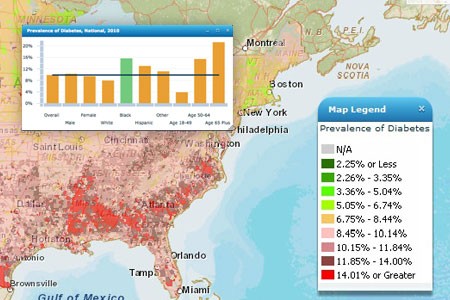
March 18, 2024
By Adjoa Kyerematen
National Minority Quality Forum Announces 2024 “40 Under 40 Leaders in Minority Health” Award Recipients
Read More

For Immediate Release
March 15, 2011 | WASHINGTON D.C.
The U.S. Diabetes Index: Mapping the Diabetes Community
Measuring Prevalence, Outcomes and Cost
The National Minority Quality Forum and the Congressional Black Caucus Foundation, in collaboration with the CBC Health Braintrust, is launching the U.S. Diabetes Index (USDI) (www.usdiabetesindex.com)—the national index by which diabetes in the United States will be measured. Other stakeholders include the Diabetes Care Project, and Gallup and Healthways, authors of the Gallup-Healthways Well-Being Index.
USDI and its companion website, www.usdireport.com, provide the most comprehensive source of available data about people living with diabetes, their care, and the trends that are shaping the disease in the United States. USDI houses more than 30,000 maps, charts and graphs depicting diabetes prevalence, costs, the uncontrolled and pre-diabetes populations, co-morbid conditions, and other important indices segmented by geography, including national, state, county, city, congressional, state legislative and zip code levels, and by age, gender, and race/ethnicity. USDI Report is an online web site designed to provide critical intelligence about the diabetes epidemic in the United States. Its mission is to reduce the incidence of the disease, improve patient outcomes while encouraging the effective management of our health care resources. USDI Report not only draws upon the robust amount of information to be found in the U.S. Diabetes Index, but also collaborates with Gallup and Healthways and other third party information providers to present the most current and updated depiction of diabetes in America.
Diabetes is a public health crisis in America with the elderly and minority populations most vulnerable to the ravages of this disease. According to the USDI, almost half of all patients with diabetes are not controlled; only 55 percent of diabetics check their blood sugar at least once a day; and more than half report not visiting their doctor over a 12-month period. The rising rates of obesity, the aging of the American population, the higher risk for the disease among minorities, and poor prevention are creating a health and economic crisis for the U.S.
Dr. Gary Puckrein, USDI developer and CEO of the National Minority Quality Forum, observed that, “Diabetes has geographical features to it; that is, blood glucose levels, prevalence, rates of hospitalization vary by geography. USDI allows us to direct our resources to the most affected areas so that those living with the disease in high-risk communities are no longer subjected to the patterns of avoidable hospitalizations and premature death that currently afflict them. We are pleased to make this resource available to our industry partners as well as to patient advocates and health partners such as the Diabetes Care Project (www.diabetescareproject.org)—a coalition of patient advocates and health partners committed to improving each patient’s health outcome while lowering costs for the entire health system.”
“We are pleased to collaborate with the National Minority Quality Forum,” says Congresswoman Donna Christensen, MD, who chairs the Congressional Black Caucus Health Braintrust. “Given the health care and budgetary concerns that are in the forefront of deliberations on Capitol Hill and in state capitols across the country, this tool can help inform the public discourse on how and where health care dollars are best spent on diabetes prevention, care and treatment.”
Dr. Jaime Davidson, Professor of Internal Medicine, University of Texas, Southwestern Medical School, Division of Endocrinology and a past Council member for the Texas Department of Health, noted that, “Mapping diabetes can help local physicians understand the populations they are working with and better tailor prevention and treatment efforts to that particular community. The maps crystallize the problem unlike any other resource available and graphically illustrate the diabetes crisis and the need for urgent action.”
The Diabetes Care Project (DCP) (www.diabetescareproject.org) is a coalition of patient advocates and health partners whose goal is to educate patients, caregivers, healthcare providers and policymakers on the value of developing personalized management plans for diabetes patients in an effort to improve each patient’s health outcome and lower costs for the entire health system. The DCP was founded by the National Minority Quality Forum and Roche Diabetes Care. Partners include the American Association of Diabetes Educators (AADE), the Alliance for Aging Research, and Healthways, Inc.
The Congressional Black Caucus Health Braintrust has long established itself as an authority on African American and minority health policy on Capitol Hill. The CBC Health Braintrust, under the able leadership of its Chair, Congresswoman Donna Christensen of the U.S. Virgin Islands, is on the front lines of ascertaining the minority health repercussions of all health policy proposals, as well as other social and public policy proposals, and supporting legislation that will ensure health equity and justice across all populations.
About The Forum
The National Minority Quality Forum (NMQF) is a 501(c)(3) not-for-profit, non-partisan, independent research and education organization. The vision of NMQF is a health services research, delivery and financing system that provides quality and effective health services to the biodiverse American general population of the 21st century. NMQF helps assure that national and local quality improvement initiatives are informed by scientific evidence, and place a priority on the quality of care and patient outcomes in all populations.
Media Contact
Anne Prince
202.276.3943